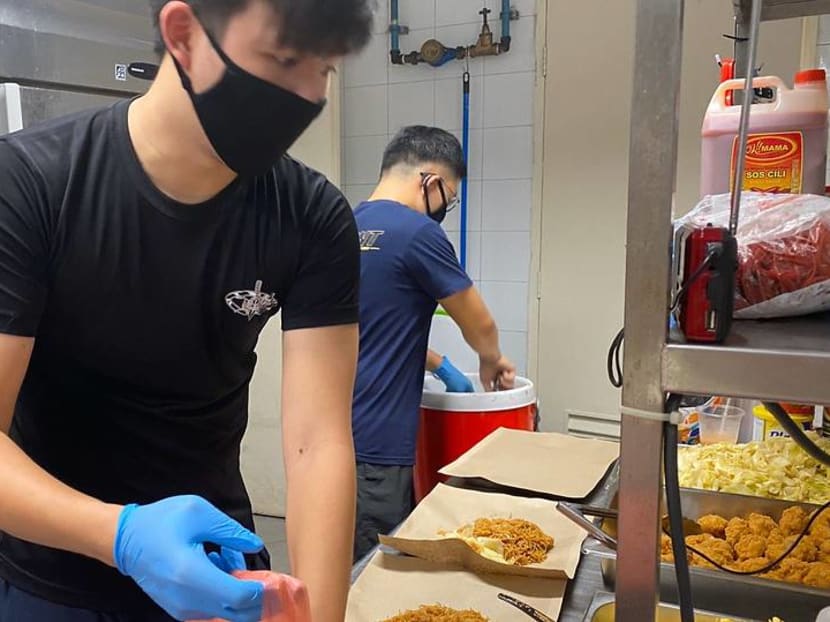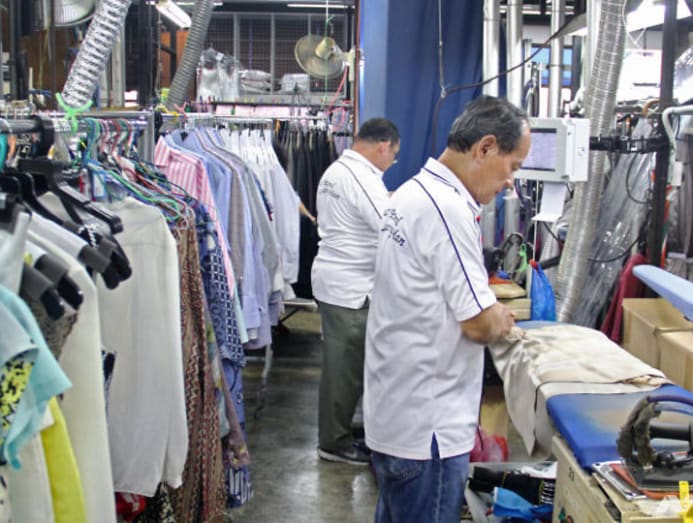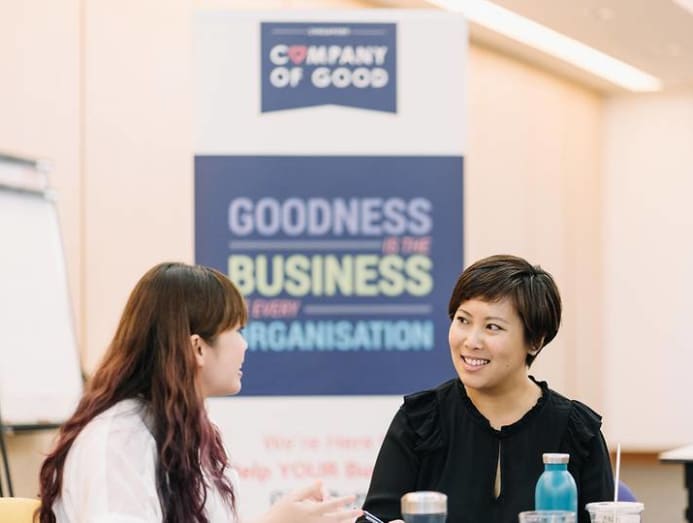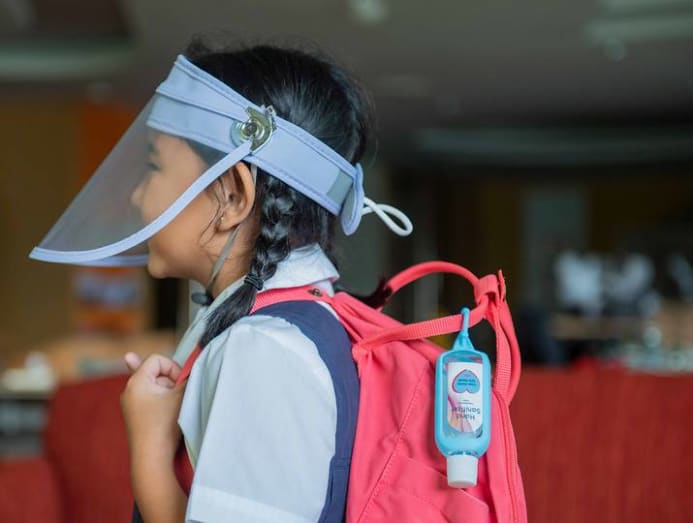commentary Commentary
Commentary: Uptick in corporate giving during COVID-19 is much more than just a PR exercise
Businesses are re-positioning their role in society with more purposeful and sustainable contributions, says NVPC CEO Melissa Kwee.

Lee Ray Sheng, 20, packing breakfast of bee hoon for delivery to elderly beneficiaries, through the Food Bank. (Photo: Lee Ray Sheng)
SINGAPORE: Last week, I was introduced to two businessmen who wanted to start a fund to help micro-enterprises tide through this period.
They wanted to put money into the pockets of those least covered by the generous government support. The only condition? The recipients be offered an opportunity to give back when their business had stabilised.
For example, hawkers could pay it forward with free meals to those in need once they were back on their feet.
These men didn’t want fanfare, they just wanted to help.
Recently, we also read of the anonymous funeral token contributions from the Sheng Siong supermarket management to support families in their neighbourhoods.
When tagged on social media, they promptly untagged themselves.
Like the two humble businessmen, it wasn’t for the publicity – it was just the right thing to do when presented with a clear need.
Beyond individual acts of charity, we are also witnessing shifts in business practices, perhaps inspired by leaders but hopefully sustained by purpose.
READ: Commentary: COVID-19 has shown that we can be gracious. How do we make it last?
READ: Commentary: I miss my regular bar – but I accept I might never get to return, even after circuit breakers are lifted
COVID-19 has revealed that most of us underestimated this pandemic and the way it has rippled through society and the economy.
But the signs from these past months are encouraging and show that businesses have begun to rethink risks and reimagine their role and purpose in society.
PUTTING PEOPLE FIRST
As many as 99 per cent of businesses in Singapore are SMEs, which employ 65 per cent of our workforce, with 80 per cent of them in the service industry.
People are a vital asset and pillar of our economy, yet most businesses think of shareholders and not stakeholders first. With a single-minded focus on profitability, we have cut corners and shown profit in the short-term but have not created lasting value.
For example, squeezing margins often ends up meaning squeezing people and the resultant quality. And while technically permissible, awarding a tender based on quality, and not just the lowest cost, raises more eyebrows than affirmation.
We even have language that places a halo around cost-savings such as value-engineering and tax-efficiency.

With COVID-19 however, we have seen the emergence of leadership that acknowledge people as the heart and soul of our businesses.
Businesses continuity has meant ensuring employees’ well-being during this period, like the companies which proactively sought safe living conditions for their Malaysian staff when many were stranded because of the circuit breaker.
I recall a friend offered his empty property to another to shelter their employees at no cost, asking only that this company pay it forward in the future.
Many businesses are also realising that retaining workers by retraining or redeploying them now is a better option than retrenchment, which is a costly exercise since it involves pay-outs now and recruitment and training costs in the future.
READ: Commentary: The circuit breaker was a time many of us want to forget. Let’s make it count
READ: Commentary: Were you fired or retrenched? Your employer may not tell you the difference
Following the Government’s paycuts at the top, senior leadership of corporates including Singtel, SATS and Comfort DelGro followed, while seeking to retain the jobs of their general workforce, especially those with low-wage workers.
The founders of start-up Klook even decided to forgo salaries to keep their business alive and created a customer engagement and revenue stream to help feed 5,000 migrant workers with their Klook Cares initiative, which partnered vendors like Casuarina Curry, Ananda Bhavan, Chef in a Box and Curry Nations, to provide lower-cost meals to the Migrant Workers Centre and the Alliance of Guest Workers Outreach.
FoodXervices leveraged its food donation platform the Food Bank Singapore and delivered over 500kg of dates during Ramadan through partnerships with local mosques and Roses of Peace, and tens of thousands of meals through a network of SME caterers.
Staff now focus on cooking for the needy as part of their training and engagement instead of being unproductive at a time of such great need.
READ: Commentary: Soon you may be competing with talent globally. The Fortitude Budget is a wake-up call
READ: Commentary: Cash assistance is often shunned but enhances the safety net for low-income families
This in turn tends to lead to higher staff engagement and productivity. According to NVPC’s Corporate Giving Survey 2017, 96 per cent of companies in Singapore saw more satisfied employees after engaging in corporate giving.
RETHINKING THE OPTIMAL LEVEL OF PROFIT
It is easy for cynics to brand some of these moves as a public relations exercise. But there is a deeper reason behind why more businesses have come forward to give during COVID-19.
In 2007, one of the world’s largest private enterprises, Mars Corporation, asked itself: “What is the correct level of profit for us?”
Their Chief Economist Bruno Roche spent the next few years rigorously developing the Economics of Mutuality framework and metrics to determine how a company should evaluate the total flow of what it takes, gives and the value it creates over time in financial, human, social and environmental capital.

For a family-run business that was in the game for the long term, sustainable growth meant a more conservative view of risk and value and a resistance to maximise profit across the business.
This meant each supplier, customer or contractor was not squeezed each quarter and were aligned and invested for the longer term. Instead of exacting the lowest price from their suppliers, they focused on competitive pricing that enabled suppliers to also invest in quality, innovation and building resilience.
Make no mistake though - companies are not charities. But every company exists to create value in society and if well-managed, many can play their part when crises strike.
The purpose of companies is to find profitable solutions to solve problems faced by society. Intelligent businesses are also optimising how they contribute to society, even in lean and disrupted times like these.
READ: Commentary: COVID-19 will bring on the Great Reset the world needs
For example, by using resources that they already owned or where they enjoyed competitive cost structures, companies have found ways to add value.
During COVID-19 in Singapore, Grab launched GrabCare for healthcare workers who were being shunned on public transport. Fullerton Health launched a symptom checker app which now operates in multiple languages and territories.
EtonHouse developed an e-book to teach children about the coronavirus, while Oddle has been helping food and beverage (F&B) clients establish and grow an online presence following the stay home circuit breaker measures.
READ: Commentary: Getting your food order delivered should be straightforward so why isn’t it?
Listen: How many stars will you give Singapore's F&B industry this COVID-19 season?
The Singapore Metal & Machinery Association mobilised a donation of 3,800 sets of personal protective equipment (PPE). Manufacturers shifted production to make protective equipment at cost, while others like Ramatex directed innovation towards providing cheaper, better quality masks.
Temasek, with their strong supply chain relationships, offered hand sanitisers to every household in Singapore.

Today, more companies are trimming the fat off less strategic giving and consciously using their core businesses and sharing their margins to uplift and sustain others in society as part of a broader social compact.
FROM EGOCENTRIC TO ECOSYSTEM
Crises are also when the weakest links are revealed and teams with the strongest leadership shine.
LISTEN: How Singapore businesses and workers can thrive in a post-pandemic new normal
Gift-a-meal and pay-it-forward initiatives have sprouted in abundance as the paradox of food insecurity and food waste are brought to light.
Food Bank’s Feed The City programme has been working with various F&B businesses to prepare and deliver more than 10,000 meals daily, while Project Belanja by Blossom World Society, in collaboration with the Restaurant Association of Singapore, has focused its efforts on catering meals for migrant workers supported by ItsRainingRaincoats, with various corporates contributing both food and funds.
Further, as many as 32 companies made the news for donating or returning S$35 million of Jobs Support Scheme credits from the government so that others in greater need could benefit.
We have also seen great leaps in efforts to achieve digital inclusion by helping disadvantaged students, seniors and households get internet access or digital devices.
SMEs like Xpointo Media created the Bridge the Digital Divide project to repurpose and redistribute quality laptops to charity partners, while Engineering Good set up a wider partnership to do likewise with various corporate and community donations.
READ: Commentary: COVID-19 has revealed a new disadvantaged group among us – digital outcasts
Mental health efforts have also increased with small cracks becoming larger fractures at home and at work, placing an emphasis on work-life balance and how businesses can support strong family lives, relationships and communication skills.
The National Council of Social Services is also part of the WorkWell Leaders Workgroup - a ground-up initiative started by a group of C-suite executives - that has been championing mental health in the workplace to this end.

In February, mental health champion Jardine Matheson joined with Splash and BusAds to create a series of stickers to raise awareness of mental health support hotlines available. The stickers were pasted at 54 Giant, Cold Storage and Guardian outlets across Singapore.
These are areas that may have been part of sporadic corporate social responsibility (CSR) efforts in the past but now they add value to a wider ecosystem.
The most common reason why CSR efforts fail is because they are seen as a peripheral function unlinked to the business and often one-off, reactive activities devoid of a larger strategic intent.
Public scepticism is liberally applied to all, but those who earn trust and credibility are those who have consistent, value-driven and value-creating efforts.
With this new awareness, corporate giving is moving towards the core of business’ purpose and influencing strategy and operations in more sustainable and thoughtful ways.
Recovery is still distance away, but with more collaborative and strategic thinking about the drivers of societal and business resilience, we have cause to be hopeful. COVID-19 has taught us that none of us are truly safe or prosperous until all of us are.
LISTEN: Singapore's relationship with migrant workers: It's complicated?
BOOKMARK THIS: Our comprehensive coverage of the coronavirus outbreak and its developments
Download our app or subscribe to our Telegram channel for the latest updates on the coronavirus outbreak: https://cna.asia/telegram
Melissa Kwee is CEO of the National Volunteer & Philanthropy Centre (NVPC).





